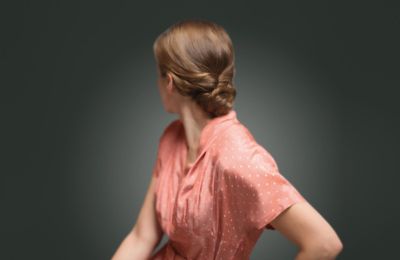“The Scribe” Zofia Posmysz. A witness to history between truth and post-truth

In June 1943 I began work as a scribe. Immediately after the roll call, I went to my office. This was roughly around seven or 8:30. At 8 o’clock the kitchen guard arrived, as a rule this was Frau Franz, to replace the night guard. Immediately after I arrived, I began work on adding up and checking those present in the blocks. I also had to write down the regulated portions, i.e. the food rations assigned to every prisoner. Then I had to work out the corresponding amount of products for the particular day. Each day there was bread and also something to put on the bread. I had to work out all this and adjust the total to the number of portions required.
When the guard Franz took a break at midday, I had a little time to be able to write for myself. As a sort of secretary I had access to writing materials. I began by making notes about everyday life but soon moved over to poems. Today I do not regard them as poetically valuable. I wrote the outlines for the poems on loose pieces of paper. One day I received a notebook into which I transcribed the poems. At last, I was able to collect them all together. Most of the poems were prayers or memories of freedom. Some of them referred to the death of Tadeusz. One of these poems is also important to me: List do Matki [A Letter to my Mother]. Writing poems came from my wish to tear myself away from the inhuman reality which surrounded us. And this reality became increasingly more horrifying. True, we people who were working in the kitchen and the bread storage room had things much easier and better than the other prisoners; that said, the events on the ramp and in the gas chambers had an appalling influence on our lives. We knew about the hecatomb, the apocalypse that reigned there every day. Day and night we could hear the trains arriving, one transport after the other. Whether we wanted it or not, we were witnesses to everything that happened and somehow also participated in it. My writings were probably an attempt to tear myself away from this appalling reality. That said, not all my poems were a flight into another world. There are also some that I might call political. One of them accused England of being an accomplice to the Holocaust because it had done nothing. In Auschwitz people were dying, the crematoria were alight, the chimneys were smoking day and night, we were stifling in the camp from this stench of burning bodies and England is doing nothing. I thought, for this it should itself stifle to death out of shame.
My last meeting with my guard, Franz, was directly before she left Auschwitz. Along with the leading members of the camp, all those decorated SS men and the prisoners, she abandoned the camp before it was evacuated. I had the impression she wanted me to come with her. She never said that directly, but at the time I thought it better to distantiate myself from the action so I went to Frau Doktor Stefania Perzanowska[2], who was working in the camp hospital. I asked her to hide me in the hospital for a few days because I wanted to wait until the SS group had left. Frau Doktor Perzanowska understood me only too well and allowed me to come the next day: “I shall give you something to make you run a high temperature.”
I was given a simple injection of milk in one of my buttocks. I had no idea that it could be so effective. In any case I quickly ran a high temperature. My guard, Franz, was so curious about my sudden illness, which she heard about from the other prisoners, that she came to the hospital to check what had happened. Doktor Perzanowska accompanied her to my bed and began to explain that such a high temperature might mean I had a serious contagious sickness. She also told her something that infuriated her: “Rubbish” she said, turned around and went. That was the last time I saw her.
After the war I followed the trials of the SS men. I observed and waited until my guard, Franz, arrived before the court. I knew that I would surely then be invited to be a witness. All the time I was considering what I could say about her, how I should say it, what situations I should mention … I recalled various facts about her behaviour, her reactions … I never managed to arrive at a psychological characterisation: these were only my suppositions and thoughts. But I was thinking about them the whole time. Finally, I came to the conclusion that I was unable to say very much about her, just that she treated me fairly. These considerations led to my idea of writing a tale about an accidental meeting with an SS woman. The upshot was a novel entitled “The Passenger” which was inspired by a strange event in Paris.[3]
[2] Stefania Perzanowska (1896–1974) arrived in Auschwitz on 15 April 1944 on a transport from the Lublin (Majdanek) concentration camp, where she was a hospital doctor. She was given the number 77368.
[3] Zofia Posmysz met a group of German tourists on the Champs-Élysées. The voice of one of the women sounded almost like the voice of the guard Franz.














